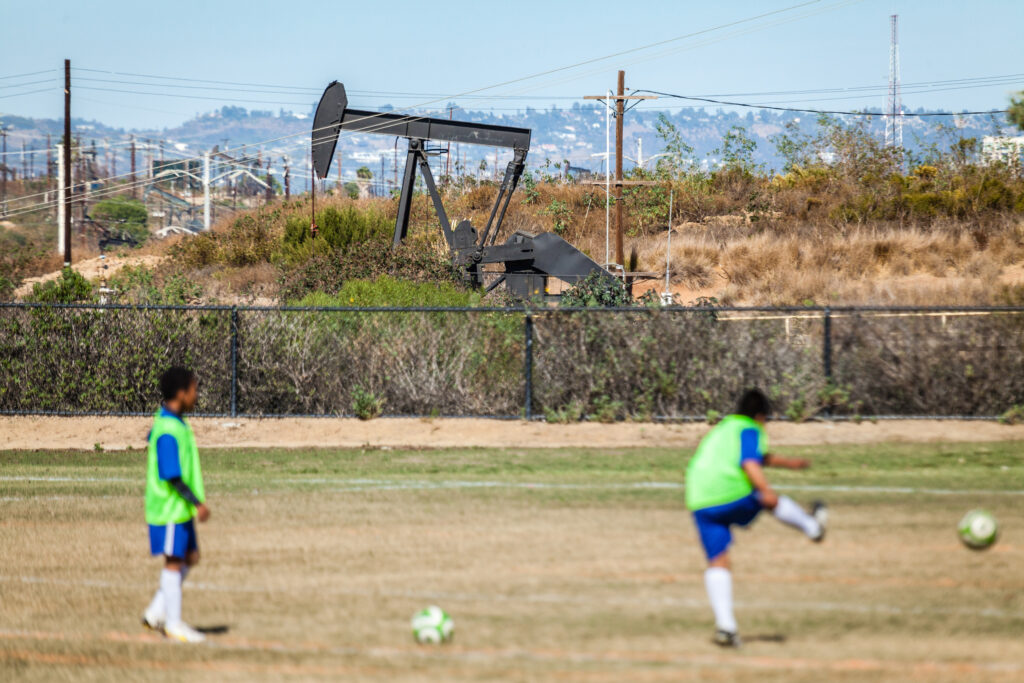California Governor Gavin Newsom signed new laws on Wednesday to hold oil companies accountable and protect neighborhoods from oil development, marking a significant victory for community groups.
“It has been a long and winding road to get here,” said Martha Dina Argüello, executive director of Physicians for Social Responsibility Los Angeles, at the Inglewood Oil Field in Los Angeles.
“This moment has been fueled by years of persistent and principled organizing by many community organizations,” Argüello said. “Communities that have lived with the harmful effects of oil drilling and pollution where we live, work, play, and learn.”
Over 1 million Californians live near active oil and gas wells, with more than 60 percent in Los Angeles County, most of whom are Black, Latino, or socioeconomically marginalized, researchers reported last year.
“The oil industry has fought back with its wealth, power, dirty tactics, and profits made off the backs of our communities,” Argüello said. “We have faced this industry with its deep pockets and we have prevailed. Justice has prevailed.”
Activists had rallied in Sacramento last month to urge their state senators to pass the “make polluters pay” package. The bills reached the governor’s desk after passing the state Senate in late August.
Newsom signed the bills on a Los Angeles County soccer field where kids struggled to breathe while playing near polluting oil wells.
The laws affirm local governments’ authority to restrict or ban oil drilling (A.B. 3233), accelerate the timeline for plugging the state’s idle wells (A.B. 1866), and penalize companies that operate low-producing wells within the Baldwin Hills Conservancy (A.B. 2716).
Inglewood Mayor James T. Butts shared emotional remarks, recalling how he and others believed the oil wells were dinosaurs as children. He thanked the governor and legislators for cleaning up low-producing wells and directing funds back to the community to give kids better opportunities.
A.B. 3233 overrides recent court decisions that overturned local ordinances, affirming local governments’ right to regulate polluters in their communities.
Los Angeles County Supervisor Holly Mitchell, who led the county effort to restrict drilling, said her son, who has asthma, “tried to play soccer on this field.”

Mitchell emphasized the importance of proximity, highlighting the multi-generational harm caused by living, working, and playing near oil wells.
A.B. 2716, authored by Assemblymember Isaac Bryan (D-Los Angeles), prohibits companies from operating wells that produce less than 15 barrels of oil a day within the Baldwin Hills Conservancy and imposes a $10,000 monthly penalty for wells that have been low-producing for over a year.
A.B. 1866 increases fees for operators who fail to plug and clean up idle wells. “There are more than 40,000 idle oil wells that are leaking into our groundwater and polluting our air, and the oil companies are not taking responsibility,” said author Gregg Hart (D-Santa Barbara).
These new laws are a significant victory for frontline communities bearing the brunt of oil and gas pollution for decades, said Hollin Kretzmann, senior attorney with the Center for Biological Diversity.
Even as Newsom thanked advocates and legislators, he warned that the battle is not over. Legislators will meet in a special session to stabilize gas prices, which remain higher than the national average despite dropping crude oil prices.
“We are taking on Big Oil and have a real chance of winning,” Newsom said, emphasizing the need to hold oil companies accountable.
Community members remain committed to protecting their neighborhoods from polluting oil and gas wells. “We remain steadfast in our mission and dedication to protect our communities,” said Argüello. This includes ensuring the implementation of these laws to benefit communities.
Original Story at insideclimatenews.org
